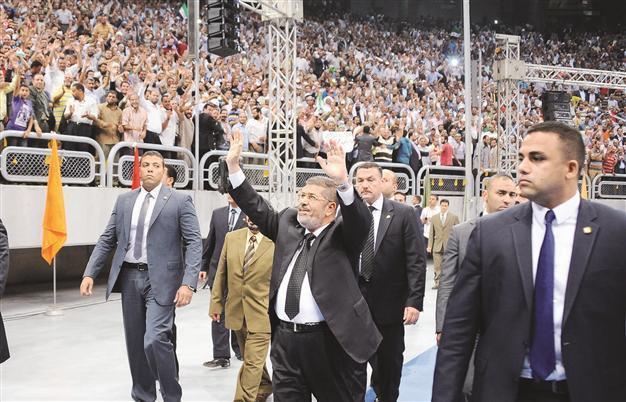Egypt cuts Syria ties, calls for no-fly zone
CAIRO / DAMASCUS

Egyptian President Mohamed Morsi (C) waves at thousands of supporters as he arrives for the ‘Support for Syria’ rally at a Cairo stadium. AFP photo
Egyptian President Mohamed Morsi said June 15 he had cut all diplomatic ties with Damascus and called for a no-fly zone over Syria, in the latest blow to the embattled President Bashar al-Assad.Addressing a rally called by Sunni Muslim clerics in Cairo, Morsi said: “We decided today to entirely break off relations with Syria and with the current Syrian regime.” He also warned al-Assad’s allies in the Lebanese Shiite militia Hezbollah to pull back from fighting in Syria.
“We stand against Hezbollah in its aggression against the Syrian people,” Morsi said. “Hezbollah must leave Syria - these are serious words. There is no space or place for Hezbollah in Syria.” Morsi said he was organizing an urgent summit of Arab and other Islamic states to discuss the situation in Syria, where the United States has in recent days decided to take steps to arm the rebels.
Morsi, who spoke at a packed 20,000-capacity stadium and waved Syrian and Egyptian flags after his entrance, also urged world powers not to hesitate to enforce a no-fly zone over Syria. “The Egyptian people supports the struggle of the Syrian people, materially and morally, and Egypt, its nation, leadership ... and army, will not abandon the Syrian people until it achieves its rights and dignity,” he said.
The Syrian government condemned Egypt’s decision, calling it an “irresponsible” move. “The Syrian Arab Republic condemns this irresponsible position,” an unnamed Syrian official told state news agency SANA. The official said Egyptian President Mohamed Morsi had joined the “conspiracy and incitement led by the United States and Israel against Syria by announcing the cutting of ties yesterday.”
US pessimistic on solution
“Syria is confident that this decision does not represent the will of the Egyptian people,” the official added, accusing Morsi of announcing the severing of ties to deflect attention from internal crises.
Meanwhile, U.S. Secretary of State John Kerry asked Iraq to do what it could to help halt new military supplies from reaching al-Assad’s forces, the State Department said in a statement on June 15 that gave details of Kerry’s telephone call on June 14 with Iraqi Foreign Minister Hoshyar Zebari. “The secretary reaffirmed that the United States continues to work aggressively for a political solution with the goal of a second Geneva meeting, but that the use of chemical weapons and increasing involvement of Hezbollah demonstrates the regime’s lack of commitment to negotiations and threatens to put a political settlement out of reach,” the department said.
Kerry had not previously expressed such pessimism about prospects for the conference, which has run into many obstacles. These include disarray in the Syrian opposition and military gains by the Syrian army and its Lebanese Hezbollah allies against rebels who have few ways to counter al-Assad’s air power.
















